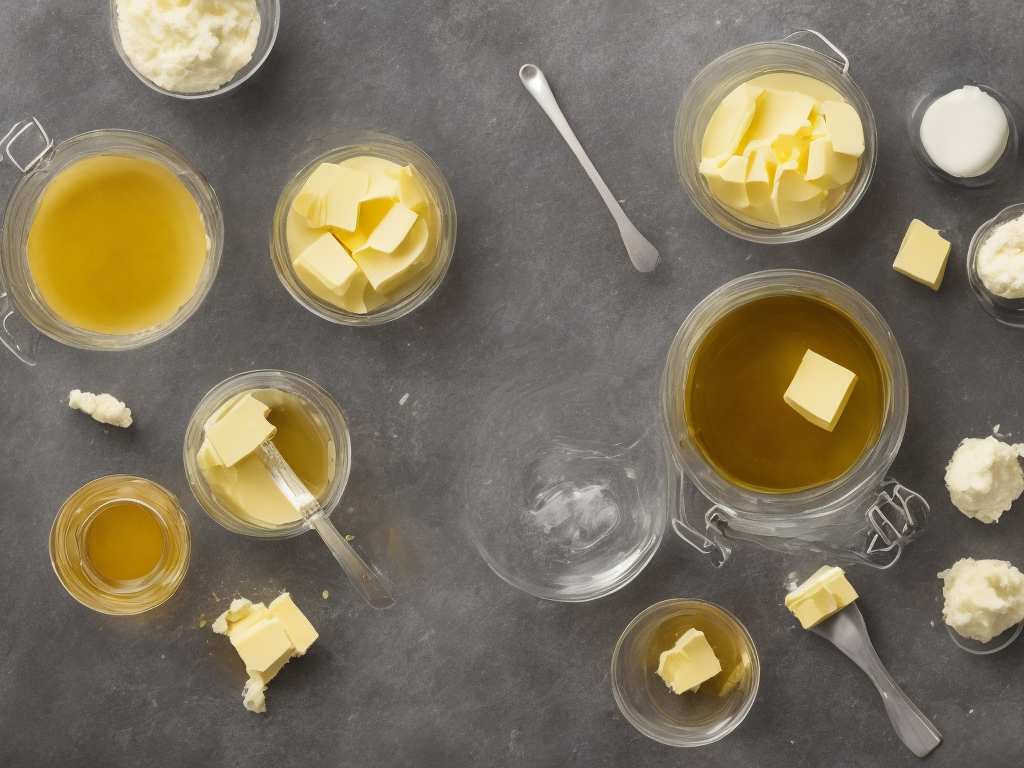
Ghee and oil are both common cooking ingredients used in many parts of the world. They both have similar characteristics and can be used for similar purposes, such as frying, sautéing, and baking. However, there are significant differences between the two that make one a better choice than the other in certain situations.
The first main difference between ghee and oil is their source. Ghee is a type of clarified butter that originated in India and has been used in Ayurvedic medicine for thousands of years. It is made by simmering butter until the milk solids separate and are removed, leaving behind a pure golden liquid. In contrast, oil is extracted from seeds, nuts, or fruits, and is a popular cooking ingredient in many cultures.
The nutritional profile of ghee and oil is also different. Ghee is rich in healthy fats and contains more vitamins, such as A, E, K, and D, than most oils. It is said to be a good source of conjugated linoleic acid (CLA), which is believed to offer health benefits such as reducing inflammation and promoting weight loss. However, it is also high in saturated fats, which can increase cholesterol levels if consumed in excess.
Oil, on the other hand, has different types of fats depending on the source. For example, olive oil is high in monounsaturated fats, which are considered heart-healthy and can help lower bad cholesterol levels. Sunflower oil, on the other hand, is high in polyunsaturated fats, which have been shown to lower both good and bad cholesterol levels. Some oils, such as coconut oil, are also high in saturated fats, which can increase cholesterol levels if consumed in excess.
Another important difference between ghee and oil is their smoke point. The smoke point is the temperature at which an oil or fat begins to smoke and break down, creating harmful compounds that can be hazardous to health. Ghee has a higher smoke point than most oils, making it a good choice for high-heat cooking methods such as frying or baking. The smoke point of ghee is around 250°C, which is much higher than most oils, such as olive oil which has a smoke point of around 190°C.
The reason for the higher smoke point of ghee is due to the removal of the milk solids during the clarification process. These milk solids are what causes the flashpoint of butter, and by removing them, ghee has a much higher smoke point. Oil, on the other hand, has a lower smoke point and is more prone to breaking down at high temperatures, which can lead to the development of harmful compounds called acrolein.
Another difference between ghee and oil is their flavor. Ghee has a nutty, rich flavor that is the result of the caramelization of the milk solids during the clarification process. It is often used in Indian cuisine as a flavor enhancer and is also known for its medicinal properties. Oil, on the other hand, has a more neutral flavor and can be used for cooking a wide variety of dishes without adding its own flavor.
Lastly, the potential for allergic reactions can differ between ghee and oil. Those with dairy allergies or lactose intolerance may find ghee to be a better option than butter or other dairy-based products, as the milk solids are removed during the clarification process. However, ghee is made from butter, which means that it may still contain trace amounts of lactose, so those with severe allergies should exercise caution.
In contrast, oil is a plant-based product, which means that it is generally safe for those with allergies or intolerances to common allergens. However, some oils, such as peanut oil or sesame oil, may cause an allergic reaction in those with nut allergies.
In conclusion, there are significant differences between ghee and oil that may make one a better choice than the other in different situations. Ghee is a type of clarified butter with a nutty flavor, high smoke point, and rich nutritional profile, making it a good choice for high-heat cooking methods and flavoring dishes. Oil, on the other hand, has a more neutral flavor, lower smoke point, and different types of fats, making it a good option for a wide variety of cooking methods, from sautéing to baking. Ultimately, the decision between ghee and oil depends on personal taste and cooking needs.
 Self-Instruct
Self-Instruct